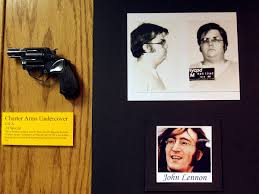
LET ME TAKE YOU DOWN, Inside the Mind of the Man who Killed John Lennon.
US, 2020, 90 minutes, Colour.
Jack Jones.
Directed by Bill Badgley.
This HBO documentary was released at the time of the 40th anniversary of the murder of John Lennon in New York City, 8 December, 1980.
The title comes from the book by journalist, Jack Jones, the result of interviews with the killer, Mark David Chapman, and Jones’ research. The book was published when Chapman had served 30 years in prison, in 1992.
Now a much older and quite rugged Jack Jones gives an extended interview for this film, showing the material he had accumulated, newspaper articles and print media, as well as the range of tapes, especially those with Chapman himself as well as with his wife, Gloria. (And, later in film, Jones is able to elaborate on his own story, his service in Asia, marriage, daughter, a drunken driver crashing into the car and the death of his wife, his work in Vietnam, his interest in trying to understand why people would kill.)
The film offers a descriptive biography of Chapman as well as many visuals, home movies, photos, as well as the voice of Chapman on tape and in phone calls. He was born in 1955, 25 at the time of killing John Lennon. Much evidence is given about his family, his resentment against his father, his mother leaving his father – and the overall impact that he never lived up to expectations, a poor self-image, leading to a general state of depression. However, with this background, it emerges that Chapman was also narcissistic, that everything was to be seen in comparison with himself, that he had a preoccupation with Lennon, admired him, then became disillusioned because he lived in wealthy comfort, made odious comparisons which led up to his killing Lennon.
There is also a lot of religious background to Chapman, sequences of his church practice, his language about Jesus, about God. In the phone calls, there is also religious language, Chapman always referring to God and God’s blessing.
Chapman travelled a great deal, saw the world, visited Asia and saw its poverty, settled in Hawaii, had a range of jobs including security guard, met travel agent, Gloria, and eventually married her. She has stood by him over the four decades and is heard, very sympathetically, talking with Jones in phone calls.
There are also interviewers with police, detectives, with their reminiscences.
The film, as the subtitle suggests, attempts to get into the mind of Chapman and, within 90 minutes, offers a great number of leads for understanding, especially his narcissism, his inability to genuinely express remorse even though he uses many of the right words. The 11th hearing for his parole took place in 2020 – again turned down.
Interwoven with the story of Chapman is a mini-film in itself, some biographers and commentators being interviewed, tracing John Lennon’s life and career, filling in a lot of the details of the 1960s, the Beatles and their success, tours, Lennon and his marriage and his son, the break and the later 1960s, his change of attitudes, meeting Yoko Ono and her influence (highlighting the on and off reality of the relationship), the birth of their son, Sean, Lennon’s attitude towards his former wife and not caring for his son, Julian, while he was growing up. There are images and headlines of his and the Beatles’ visit to the Maharishi. Also images and headlines of his drinking and decline, going to Los Angeles, meeting up with fellow musicians. However, he was jolted, some rehab, giving up drink, in his last years settling down in New York, devoted to his son.
The film begins and ends with a close-up of John Lennon and his ideals of peace – and also, outside the Dakota building in New York City, the emblem “imagine�.